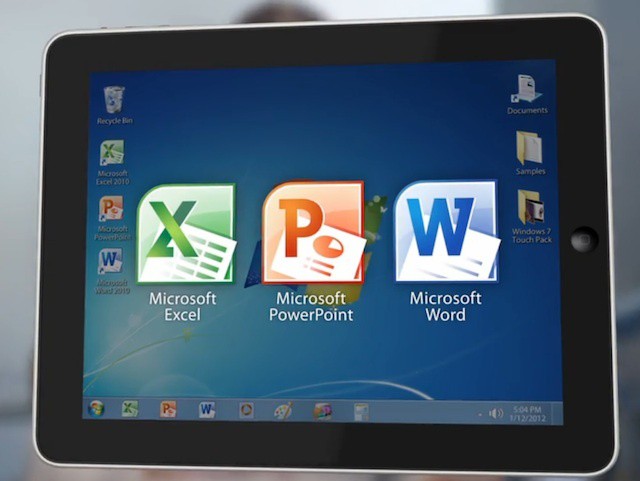Earlier this year, OnLive debuted its OnLine Desktop app for the iPad. The app offers users a virtual desktop environment that includes Windows 7, Microsoft Office, Adobe Reader, and Internet Explorer (which allows iPad users to watch Flash-based web content). The service comes in both free and paid versions that include 2GB of cloud storage and OnLive plans to expand the service with more advanced plans for both end users and for businesses.
While users and reviewers have been largely happy with OnLive Desktop, it seems that Microsoft isn’t. After being mum on OnLive’s decision to release the app and service, Microsoft announced this week that it views OnLive as violating its license agreements and essentially pirating Windows.
At issue is the draconian puzzle that is Microsoft’s licensing system and how the company charges for virtual desktops.
Network virtual desktops like the ones OnLive is offering require a special virtual desktop access (VDA) license from Microsoft. If a company purchases Microsoft’s software assurance program to ensure updates and spread out the cost of software, a VDA license is included. Since most businesses opt for software assurance, they don’t have as much to worry about when it comes to virtual desktops – so long as the computers connecting to the virtual desktop can run Windows on their own. Since iPads can’t run Windows on their own, Microsoft requires that a separate VDA license be purchased for each iPad (or Android tablet or other thin client device) that connects to a virtual Windows desktop.
Is your head starting to ache trying to keep this straight yet?
Microsoft offers another type of licensing program called a Service Provider License Agreement (SPLA). This type of license is sold to companies that sell various IT or technology services and it allows them to license solutions that they provide to clients on an ongoing basis – the approach is somewhat similar to renting or subletting software and it’s useful for companies that offer services on a month to month or other contract basis where buying a software license doesn’t make sense because the client may move on at any time.
Sounds like a perfect solution for what OnLive is offering, right? It would be except one type of license that you can’t get with an SPLA is a VDA license. Microsoft instead tells companies to have their customers buy their own VDA license if they want access to a virtual desktop of the kind that OnLive is offering. That approach certainly isn’t viable for OnLive’s consumer plans because iPad owners aren’t going to buy a license to run a virtual copy of Windows on a service they may not keep using. Companies opting for OnLive’s expected business plans might be a different story but I’d doubt many businesses would want to do this either.
Feeling that headache now? Because the expensive bureaucracy gets worse.
Even with VDA licenses for each iPad (or each customer), Microsoft requires that each customer be connected to different physical hardware – meaning different servers and different storage devices. Then there are rules about whether users are connecting to a server at the same geographical location as they are, which can be mitigated in some ways by Extended Roaming Rights (ERR).
Enterprise virtualization guru Brian Madden has more details about Microsoft’s virtual desktop licensing issues but the gist is that Microsoft has created Windows licensing terms that make it next to impossible for companies to fully comply and offer a service like OnLive Desktop.
The big question is – what OnLive will do at this point? Microsoft seems to be saying that it will work with OnLive if the company is willing to pay to bring its service in line with the company’s licensing options but it’s hard to see what that might look like or if it would be viable. Of course, other companies have announced similar solutions to OnLive Desktop, which will likely be impacted by the outcome. So far, OnLive hasn’t commented on licensing or its situation with Microsoft.
One can’t help but wonder about Microsoft’s timing in going public about this issue. Could it be because Microsoft is expected to launch an iPad version of Office in the near future or because it sees options like OnLive Desktop as a threat to its upcoming Windows 8 tablets alongside of the first Windows 8 Consumer Preview?



